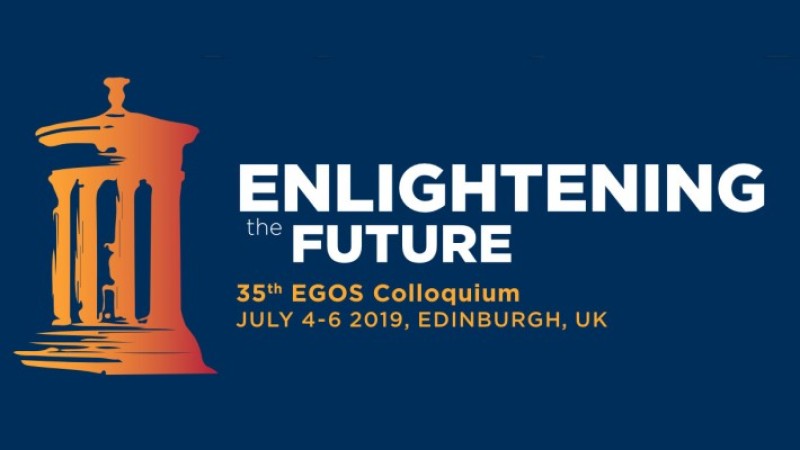Sub-theme 23: Disruptive Technologies and Organizational Capability Needs for a Sustainable Future
Call for Papers
This sub-theme applies the general theme of the 35th EGOS Colloquium “Enlightening the Future: The Challenge
for Organizations”, to the renewal and transformation of organizational capabilities in the current era of unprecedented change,
driven by high impact innovations, such as internet & IT, e-commerce and algorithm-based consumer targeting, international
internet intermediaries, smart technologies and high level automation. These technologies create the basis for new forms of
organizing and competing in almost all industries, from the automotive sector to media to healthcare, from finance to retailing
to traveling, among others.
To respond, established firms and organizations need to retire, transform, redeploy
or invent new capabilities (Helfat & Peteraf, 2003) in the form of new products, services, business models, rules, organizations,
and ecosystems. Many firms have to develop several capability building strategies simultaneously, improve existing capabilities
as well as acquire entirely new capabilities and integrate them with their existing base (Berggren et al., 2011). Automobile
firms, for example, have to innovate both for their mature technology cars and for new autonomous and electrified vehicles
(c.f. Adner & Snow, 2010; Bergek et al., 2013). This will require expansive learning, absorptive capacity, and extraordinary
organization and management skills (Dutrenit, 2000; Karabag, 2018). However, existing routines, capabilities, models of innovations
and regulation might be barriers for organizational adaption and sustainable future (Zott, 2003) and create major challenges
for managers and researchers (Schirmer et al., 2013; Sydow & Schreyögg, 2013).
Going beyond current capability
discourses, this call invites researchers from all over the world who study how disruptive technologies erode existing capabilities
and how private or public organizations struggle to form new capabilities in order to respond, adapt and survive in responsible
and ‘enlightened’ ways. The sub-theme welcomes conceptual, empirical and methodological contributions from several research
fields, from micro-level studies of individual/group interaction to macro-oriented analyses of organizations, networks and
industries.
This sub-theme particularly invites contributions that focus on one or more of the following
issues:
How do disruptive technologies create capability challenges in various organizations?
How do organizations manage barriers and constraints (e.g., old rules, competencies, knowledge stocks, path dependencies) to support thinking, acting and knowing "outside the box” and enable new capability building processes?
What are the roles of creative processes for new capability building?
How do organizations solve contradictions within and between activity systems and simultaneously build capabilities for different technologies, distribution and communication systems?
What crucial concepts, for example reflexivity (“making a difference to make a difference”) could help us to better understand the social and competitive challenges of the new disruptive competition?
How do organization design their innovation ecosystem to not only defend their existing capabilities, but also invent new ones?
How do firms in emerging economies which operate in constantly changing political and technologically environments manage the capability building challenges? Could they inspire the firms in established economies?
What capabilities are needed in public organizations to enforce social standards in a disruptive competitive landscape, driven by global actors and intermediaries?
The sub-theme intends to foster an exchange of theoretical ideas and empirical research across these and related issues.
It wishes to attract both high-quality contributions that are ready to be submitted to a research journal as well as research
in progress that explores these challenging issues. We seek to provide an opportunity for engaging in constructive dialogue
and to encourage mutual learning among the participating scholars.
References
- Adner, R., & Snow, D. (2010): “Old technology responses to new technology threats: demand heterogeneity and technology retreats.” Industrial and Corporate Change, 19 (5),1655–1675.
- Bergek, A., Berggren, C., Magnusson, T., & Hobday, M. (2013): ”Technological discontinuities and the challenge for incumbent firms: Destruction, disruption or creative accumulation?” Research Policy, 42 (6), 1210–1224.
- Berggren, C., Bergek, A., Bengtsson, L., Hobday, M., & Söderlund, J. (eds.) (2011): Knowledge Integration and Innovation. Critical Challenges Facing International Technology-Based Firms. Oxford: Oxford University Press.
- Dutrénit, G. (2000): Learning and Knowledge Management in the Firm: From Knowledge Accumulation to Strategic Capabilities. Cheltenham: Edward Elgar Publishing.
- Helfat, C.E., & Peteraf, M.A. (2003): “The dynamic resource‐based view: Capability lifecycles.” Strategic Management Journal, 24 (10), 997–1010.
- Karabag, S.F. (2018): “Factors impacting firm failure and technological development: A study of three emerging-economy firms.” Journal of Business Research, first published online on March 14, 2018, https://www.sciencedirect.com/science/article/abs/pii/S0148296318301346.
- Schirmer, F., Tasto, M., & Knödler, D. (2013): “Regimes and reflexivity: Exploring self-reinforcing mechanisms fostering and impeding innovation capability.” In: J. Sydow & G. Schreyögg (eds.): Self-Reinforcing Processes in and among Organizations. Basingstoke: Palgrave Macmillan, 81–103.
- Sydow, J., & Schreyögg, G. (eds.) (2013): Self-Reinforcing Processes in and among Organizations. Basingstoke: Palgrave Macmillan.
- Zott, C. (2003): “Dynamic capabilities and the emergence of intraindustry differential firm performance: insights from a simulation study.” Strategic Management Journal, 24 (2), 97–125.


